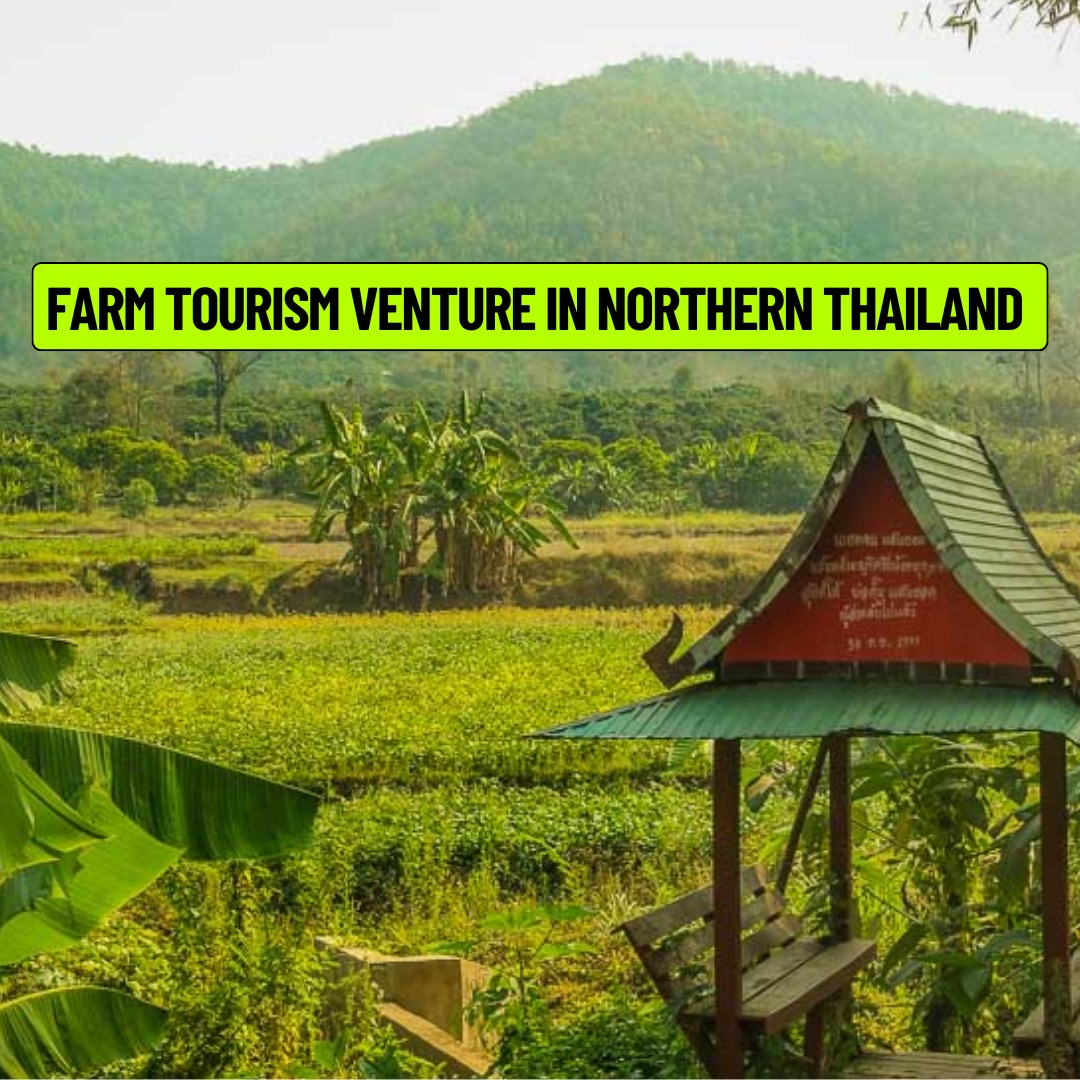Northern Thailand, with its lush green valleys, rolling hills, cool climate, and deep-rooted agricultural traditions, offers an ideal landscape for farm tourism. As travelers increasingly seek immersive and eco-friendly experiences, farm tourism—also known as agri-tourism—is rapidly gaining traction. From harvesting organic vegetables in Chiang Mai to staying in bamboo cottages surrounded by rice paddies in Pai, visitors are looking for meaningful interactions with rural life.
If you’re a foreigner passionate about sustainability, community-based tourism, and authentic Thai culture, launching a farm tourism venture in Northern Thailand could be both fulfilling and financially promising. But before setting up your venture, it’s vital to understand the legal, cultural, and operational landscape.
WHY FARM TOURISM IN NORTHERN THAILAND?
The north of Thailand is an agricultural heartland, home to diverse ethnic communities, organic farming cooperatives, and breathtaking natural beauty. Provinces like Chiang Mai, Chiang Rai, and Mae Hong Son have already embraced slow tourism, attracting travelers looking for alternatives to mainstream destinations.
This trend offers a unique opportunity to:
• Promote eco-tourism and sustainable farming
• Engage tourists in hands-on experiences such as rice planting, herbal workshops, or local cooking
• Support local communities and preserve Lanna culture and indigenous farming techniques
• Build a business aligned with conservation and responsible tourism principles
CAN FOREIGNERS START A FARM TOURISM VENTURE IN THAILAND?
Yes—but with some conditions. While foreigners cannot own agricultural land in their name, there are legal structures and partnerships that can be used to set up a business. You’ll also need the right licenses if you offer accommodation, food, or tour services.
watch our video
1. Business Structure & Land Use
Foreigners are prohibited from directly owning land in Thailand, especially agricultural land. However, you can:
• Lease land long-term (up to 30 years, renewable)
• Form a Thai limited company with majority Thai ownership (at least 51%) to legally lease or operate the farm
• Collaborate with local farmers or cooperatives and run the tourism side of the venture, such as marketing, booking, and experiences
Land use must comply with zoning laws. Agricultural land generally cannot be used for commercial development, so you may need to apply for special permissions if you plan to build accommodation or facilities.
LEGAL BUSINESS SETUP
To operate legally in Thailand, especially in a regulated sector like tourism, you must form a Thai limited company. Here’s what this involves:
1. Thai Majority OwnershipForeigners can hold a maximum of 49% of company shares, unless a special exemption is granted (e.g., through the Board of Investment, or BOI). At least 51% must be owned by Thai nationals.
watch this to know more
2. Minimum 3 Shareholders
Thai companies must have at least three shareholders, who must be verifiable.
3. Registered Capital
If you plan to hire yourself (or other foreigners), the business must show at least THB 2 million in paid-up capital per foreign employee.
4. Company Documentation
You’ll need:
• Name reservation
• Memorandum of Association (MOA)
• Articles of Association
• Statutory meeting minutes
• Company registration certificate from the Department of Business Development (DBD)
• VAT and Tax ID registration
5. Office Address
A valid commercial lease with photos, a location map, and landlord documents will be required. Rural addresses must still meet zoning and business use criteria.
LAND USE & LEASING
As a foreigner, you cannot own land, but you can:
• Lease agricultural land for up to 30 years, with the possibility of renewal
• Sign lease agreements through a Thai company (registered in compliance with the Foreign Business Act)
• Enter into joint ventures with locals, where the Thai side owns or manages the land
Zonal laws must be followed carefully. Even leased agricultural land might not be legally usable for commercial purposes like guesthouses, kitchens, or event spaces unless it’s re-zoned or granted special permission.
ENVIRONMENTAL REGULATIONS IN AGRICULTURE
Environmental Regulations for Agricultural Tourism Businesses in Thailand
When setting up a farm tourism venture, it’s not just business laws you need to follow—environmental compliance is equally important, especially in rural and ecologically sensitive zones like Northern Thailand.
1. Land Use and Environmental Impact
Before developing structures or offering tourism activities, confirm that your chosen land falls under an appropriate zoning category (e.g., agricultural, rural tourism, mixed-use). Building on forest land, watershed areas, or national park boundaries is strictly prohibited without special permission.
If your project exceeds certain thresholds, such as guest capacity, construction area, or resource usage, it may trigger an Environmental Impact Assessment (EIA). While small-scale homestay-style farms are often exempt, larger developments (e.g., lodging facilities, event areas, wastewater systems) must comply with national environmental review processes.
2. Soil, Water, and Waste Management
Thailand’s Ministry of Natural Resources and Environment requires all farm-based businesses to prevent:
• Soil erosion or degradation
• Water source contamination
• Chemical runoff from fertilizers or pesticides
If your farm uses natural springs, rivers, or wells, you must apply for water use permits and adhere to quality testing guidelines. Composting, graywater filtration, and minimal chemical use are highly encouraged and may even help with eco-certification.
3. Permits for Eco-Tourism Activities
Activities like trekking, river rafting, or animal interaction may fall under environmental tourism oversight. Coordination with local forestry departments and community groups is essential in such cases. You may be asked to submit an activity map, risk mitigation plan, or conservation pledge.
4. Sustainability Certifications
Although not mandatory, obtaining eco-labels such as:
• Green Leaf Certification
• Thailand Community-Based Tourism Standards
• Organic Thailand (Ministry of Agriculture)
can enhance your credibility, attract environmentally conscious travelers, and make you eligible for eco-tourism grants or TAT promotions.
LICENSES YOU WILL NEED
Depending on your exact offerings—accommodation, food, activities—you’ll need several licenses.
A. Tourism Business License (TAT License
If you plan to offer guided tours, cooking classes, herbal workshops, or farm experiences that fall under “tourism activities,” you must obtain a TAT license from the Tourism Authority of Thailand.
Key Requirements for TAT License
• The company must be registered under Thai law.
• The business purpose must support tourism in Thailand.
• The managing director must be a Thai national, at least 20 years old, residing in Thailand, credit-worthy, and not have a criminal record (unless for a minor offence or negligence).
• The business must not have had a Tourism License suspended or revoked (unless revoked for more than 3-5 years).
• You will need to provide evidence of office ownership or possession (lease agreement, consent letter, etc.).
• Tourist & Guide Insurance: You must hold “Tourist & Guide” insurance to protect tourists and guides. A copy of the insurance policy is required for submission.
• Business Plan: You may need to prepare a business plan, including information on tour frequency.
B. Hotel License
This license is obtained from the Department of Provincial Administration. This registration usually takes around 1.5 month. The documents required for obtaining Hotel License may require:
• ID Documents of the owner,
• Power of Attorney,
• Lease agreement or Property deed,
• Building/Land layout,
• Proof of income.
C. Food and Beverage Licenses
If you serve food, even home-cooked meals, you must register your kitchen and obtain relevant food service and hygiene permits from the local health department.
D. Environmental & Agricultural Permits
Eco-friendly farming practices are encouraged, but organic certifications or environmental impact assessments (EIA) may be needed if your activities involve large groups or sensitive land.
VISA AND WORK PERMIT FOR FOREIGN OPERATORS
Running a farm tourism business as a foreigner requires a non-immigrant business visa (Type B) and a work permit.
• You must show the company’s registration, capital investment, and office location
• Work permits are tied to specific job roles; ensure yours covers operational, managerial, or marketing duties
• Avoid performing manual labor (like farm work), as it’s often restricted for foreigners
BUILDING THE EXPERIENCE
What sets a great farm tourism business apart is not just the scenery—but the experience.
Key components include:
• Interactive farm activities: Visitors can help harvest, plant, or feed animals
• Cultural immersion: Include traditional Lanna meals, local crafts, and hill tribe storytelling
• Sustainable practices: Composting, organic farming, solar power, or zero-waste initiatives
• Educational value: Host permaculture or herbal medicine workshops
Tailor experiences to eco-tourists, families, wellness travelers, and school groups seeking authentic learning journeys.
COLLABORATING WITH LOCAL COMMUNITIES
Farm tourism thrives on community involvement. Partnering with locals not only gives authenticity to your venture but also builds goodwill and shared value.
• Employ local guides and cooks
• Source supplies locally
• Involve nearby villages in homestays or crafts
• Respect local customs and land use traditions
By adopting a community-based tourism (CBT) model, your business becomes a vehicle for social and economic impact.
MARKETING & BRANDING
In the age of conscious travel, farm tourism brands should reflect values of authenticity, sustainability, and local connection.
Use these platforms to market your farm:
• Instagram and YouTube for visual storytelling
• Booking platforms like Airbnb Experiences or GetYourGuide
• Collaborate with travel bloggers and eco-tourism influencers
• Build your own website with direct booking options
Emphasize immersive activities, seasonal farm experiences, and guest testimonials to build credibility.
FINAL THOUGHTS
Starting a farm tourism venture in Northern Thailand is not a quick project—it’s a journey that demands cultural respect, legal clarity, and community integration. But for those willing to invest time and intention, it offers more than just profit: it offers purpose.
Whether you’re helping a city-dweller plant their first seedling, sharing meals cooked over a clay stove, or building bridges between global travelers and local wisdom—your farm can become a living classroom, sanctuary, and source of joy.
Ready to Cultivate Your Dream Farm Tourism Venture in Thailand? Let our expert team guide you through the entire setup, from company registration and licensing to legal leasing and building meaningful community partnerships.
Shabadpreet Kaur






